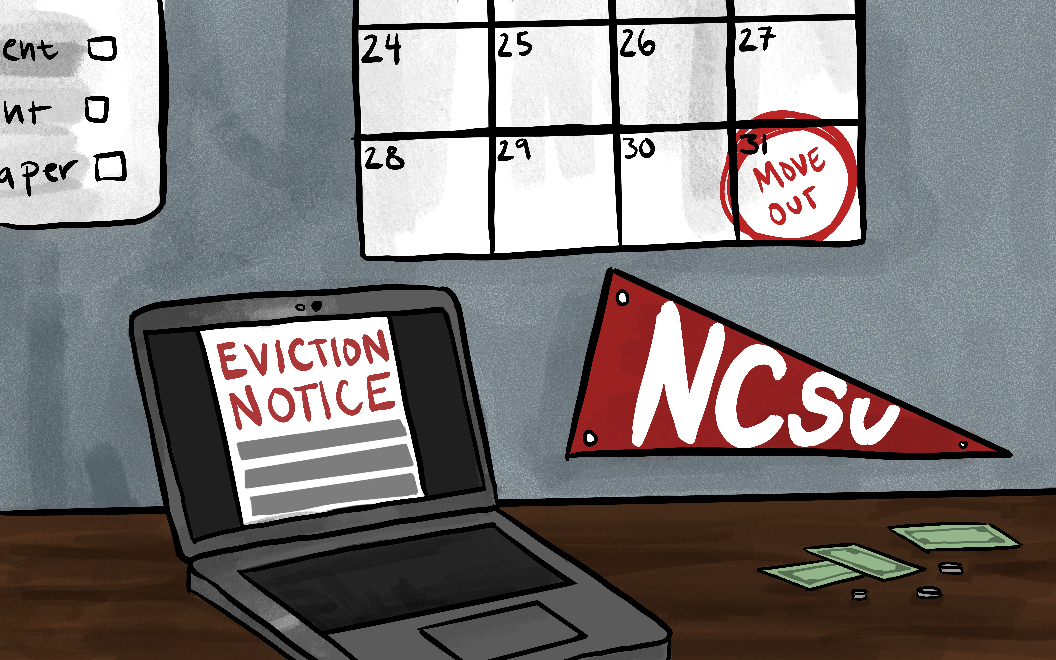While Gov. Roy Cooper’s extension of North Carolina’s eviction moratorium is set to end on June 30, many North Carolina residents continue to need aid to make ends meet. The Student Ombuds Services, an independent and confidential office at NC State that specializes in assisting student challenges, has seen an increase in students seeking advice for various issues including housing insecurities.
Mike Giancola, the assistant vice provost and student ombudsperson at Student Ombuds Services, said even with the moratorium extensions, students still face various financial stressors such as housing evictions.
“There have been cases where students have reached out and said ‘My landlord is threatening eviction,’” Giancola said. “That’s when we make sure they know about the executive order and Student Legal Services, so it has happened.”
Giancola said while Student Ombuds Services has dealt with various eviction cases over the past year, more common are students seeking help in affording rent. With the COVID-19 pandemic sparking a global economic recession, Giancola said many students don’t have the financial resources they once had. According to Giancola, international students have also felt an economic burden, with many foreign countries such as Iran now facing a decrease in their currency’s value.
“This most recent moratorium was going to end at the end of March,” Giancola said. “So when you think about the uncertainty a student might have mid-March, thinking ‘Hey, is this gonna be extended again?’ and then it gets extended on the 30th of March, there’s still a lot of stress and uncertainty students would be facing.”
Mary Haskett, a psychology professor and co-chair of the NC State steering committee on student food and housing security, said the moratorium was essential to prevent a massive house insecurity crisis.
“I think a lot of our students are going to be at risk when that moratorium is lifted,” Haskett said. “Because it doesn’t mean the rent is not due, it just means you can’t kick anybody out if you’re not able to pay, so I think what’s gonna happen, unfortunately when it’s lifted, the owners are gonna want their full pay.”
According to Haskett, the number of students facing housing instability substantially increased over the past year, with survey data showing approximately 15% of the student body had experienced housing instability as opposed to 9.6% in 2017.
To combat student homelessness, Haskett said she received some funding from the NC State University Foundation to start a Host Homes Program with various university students, staff, faculty and organizations.
“People from the community can open their homes to students who need a place to stay, so students are matched with a community member who has a space that meets their needs,” Haskett said. “We have been planning it for about a year, and we’re beginning fundraising now, and we hope to have that program ready to match students this coming fall.”
While the number of students facing food and housing insecurity has significantly increased over the past year, Giancola said the University has increased its financial resources in response to these issues. With the University receiving $17,895,881 from the Coronavirus Aid, Relief, and Economic Security (CARES) Act, Giancola said approximately $8.9 million will go towards direct student aid and $8.9 million will cover University expenses.
According to Giancola, Student Ombuds Services has provided $1,228,533 as small grants for students applying for financial assistance through the Student Emergency Fund, as well as forwarding students to other financial resources such as the Extraordinary Opportunity Scholarship Initiative. Giancola said Student Ombuds Services also collaborates with other campus organizations such as Feed the Pack, who have now upgraded their food services to include fresh produce for students facing food insecurity.
Giancola said while Student Ombuds Services has helped every student who has applied for assistance, he knows not every student knows about these programs and there’s a stigma attached to applying for food and housing aid.
“We don’t want to normalize food and housing insecurity, but we do want to normalize students reaching out for support,” Giancola said. “Just like you’d go to the health center if you had a cold, you’d see a tutor if you were struggling in class, you’d reach out to Pack Essentials if you need support with food and housing and other financial needs.”
Visit the Student Ombuds Services website for more information.













